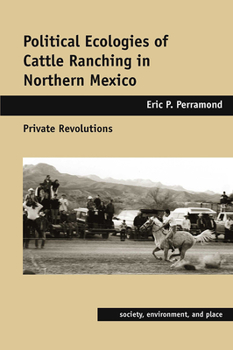Political Ecologies of Cattle Ranching in Northern Mexico: Private Revolutions
(Part of the Society, Environment, and Place Series)
Private ranchers survived the Mexican Revolution and the era of agrarian reforms, and they continue to play key roles in the ecology and economy of northern Mexico. In this study of the R o Sonora region of northern Mexico, where ranchers own anywhere from several hundred to tens of thousands of acres, Eric Perramond evaluates management techniques, labor expenditures, gender roles, and decision-making on private ranches of varying size. By examining the economic and ecological dimensions of daily decisions made on and off the ranch he shows that, contrary to prevailing notions, ranchers rarely collude as a class unless land titles are at issue, and that their decision-making is as varied as the landscapes they oversee. Through first-hand observation, field measurements, and intimate ethnographies, Perramond sheds light on a complex set of decisions made, avoided, and confronted by these land managers and their families. He particularly shows that ranching has endured because of its extended kinship network, its reliance on all household members, and its close ties to local politics. Perramond follows ranchers caught between debt, drought, and declining returns to demonstrate the novel approaches they have developed to adapt to changing economies and ecologies alike--such as strategically marketing the ranches for wild-game hunting or establishing small businesses that subsidize their lifestyles and livelihoods. Even more importantly, he reveals the false dichotomy between private and communal ranching. Political Ecologies of Cattle Ranching in Northern Mexico is essential reading for anyone interested in the future of ranching in western North America.
Format:Hardcover
Language:English
ISBN:0816527210
ISBN13:9780816527212
Release Date:April 2010
Publisher:University of Arizona Press
Length:288 Pages
Weight:1.20 lbs.
Dimensions:0.9" x 6.1" x 9.1"
Customer Reviews
0 rating





